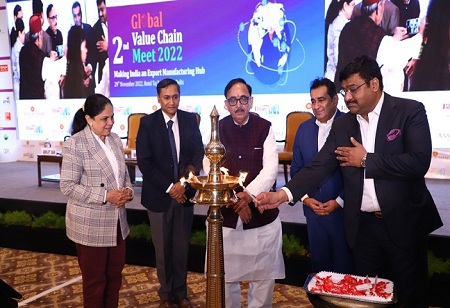“India is becoming a cost-effective manufacturing option for the world. In fact, the country, under the AatmaNirbhar Bharat campaign, has become an active hub of manufacturing as well as a part of the global supply chain. The beauty of this mission is to bring the Indian economy back on track and make the country self-reliant. It is focused on five pillars which include economy, infrastructure, system, vibrant demography and demand,” said Shri. Mahendra Nath Pandey, Hon’ble Minister of Heavy Industries, Government of India (GOI) at the 2nd Global Value Chain Meet today. The event, organised by the apex industry body Associated Chambers of Commerce and Industry of India (ASSOCHAM), focussed on ‘Making India an Export Manufacturing Hub and Investment Destination’.
Shri Pandey noted, “We are focused on revitalizing every sector – right from essential demand and supply to manufacturing. The government has taken several initiatives that help in the ease of doing business (EoDB) in India and attract investments in the country.” He elaborated on the initiatives and policies undertaken by the GOI, which include Steering Committee on Promotion of Local Value Addition and Exports (SCALE) which aims to compete by identifying potential sub-sectors of manufacturing, Production Linked Incentive (PLI) Scheme with a view to localize manufacturing and supply chain by promoting production of Indian goods, Investment Clearance Cell (ICC) has been created for EoDB through digital platform, National Single Window System (NSWS) facilitation, development of Maadhyam portal to get various commercial clearances faster
and Regulatory Compliance Portal that provides regulatory compliance solutions for businesses and citizens. He also informed, “In a proactive effort by the government to empower the Capital Goods (CG) sector, a 22-Member Inter-Ministerial Committee has been set up with the objective of providing USD 1-trillion from manufacturing sector to the 5-trillion economy that we aim to achieve as a nation.” The Ministry of Heavy Industries has also implemented a plan to make CG sector competitive with technology development.
While talking about the next generation of manufacturing, the Union Minister of Heavy Industries said, “Industry 4.0, which is getting a lot of attention from all industry sectors, will give the country's manufacturing sector a competitive edge in the global market. Programs like Make in India-focus through policies like National Manufacturing Policy will play an important role in increasing the contribution of manufacturing sector to 25 per cent by the end of 2022, which is currently at 17 per cent.”
In her opening remarks, Smt. Sushma Paul Berlia, President of Apeejay Satya & Svran Group and Chairperson of the ASSOCHAM National Council on Business Facilitation and Global Competitiveness, provided background information for the event by stating that a multifaceted action plan is required for a new export base market based on a trade complementary index. India needs to upend the conventional supply chain management strategies in order to compete in the global industrial chain.
There are three Cs (Climate, Covid-19, Conflict) that is affecting the worldwide business market, according to Shri. Shantanu Roy, Executive Director & Export Head, "and the most popular way to tackle them is resilience." India is currently the fifth-largest manufacturing base in the world and should work to overtake China as the leading exporter of manufactured goods. With a demographic advantage of a young workforce in the field, there is an increasing considerable domestic demand, he continued. Future scope should shift from national scale to worldwide scale, capability advantage, finances, infrastructure output, policy, and reforms to a global scale. R&D, high credit rates, and insurance underwriting all face difficulties.
Smt. Mohini Kelkar Director, Grind Master Machines Pvt. Ltd shared her insights on the strength of MSME in the sector and how to leverage the sector by pushing MSMEs. India should export technology-oriented products rather than traditional products that provides value. Stakeholders and Government support is required in tech development, PSUs, joint development and partnership, export finance and scale of manufacturing, she added.
